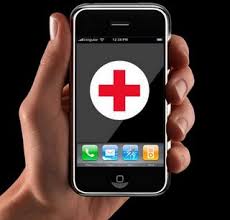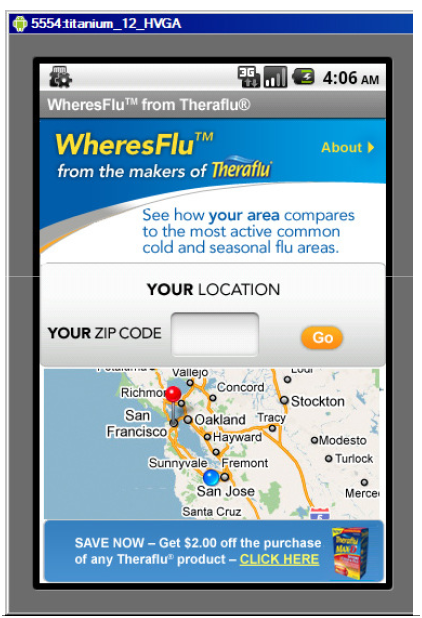February 27th, 2011 by Bryan Vartabedian, M.D. in Better Health Network, Opinion
No Comments »

 This is something. Jay Parkinson on the Future Well blog has suggested that health apps are overrated. Then on Twitter came a remark that the post represented “fightin’ words.” While I think the tweet was in jest, I’m sure there are some who will take offense to the less-than-flattering remarks about our coveted health apps.
This is something. Jay Parkinson on the Future Well blog has suggested that health apps are overrated. Then on Twitter came a remark that the post represented “fightin’ words.” While I think the tweet was in jest, I’m sure there are some who will take offense to the less-than-flattering remarks about our coveted health apps.
We love the concept of health apps for what they represent more than for what they really offer us. We want to feel that we’ve got it all in the palm of our hand. After all, technology might do for us what we won’t do for ourselves.
Like Jay I’m underwhelmed, but I don’t think that’ll always be the case. The post’s criticism should start a conversation about what’s real in mobile health and what isn’t. Even the fantasy of Health 2.0 has been questioned, and that’s a good thing. This dialog about reality versus rainbows and unicorns needs to continue.
Youngme Moon in Different: Escaping the Competitive Herd wrote, “The way to keep criticism from devolving into cynicism is to make it a starting point rather than a punctuation mark.” Jay Parkinson’s post is a starting point.
*This blog post was originally published at 33 Charts*
February 18th, 2011 by Berci in Better Health Network, Health Tips
No Comments »

As a part of the TheraFlu campaign, Novartis has developed free Android, Blackberry and iPhone applications for tracking flu outbreaks in the U.S. These days it’s become inevitable to develop free apps on all platforms in order to promote your product. From Novartis:
 Keep up-to-date on the most active cold and flu reports around the country. The WheresFlu™ app follows sickness incidence levels from week to week and keeps track of the current top 5 affected cities in the nation. The WheresFlu™ app will find your current location and provide you with results for that area. Or you can enter a ZIP code to get information for that area.
Keep up-to-date on the most active cold and flu reports around the country. The WheresFlu™ app follows sickness incidence levels from week to week and keeps track of the current top 5 affected cities in the nation. The WheresFlu™ app will find your current location and provide you with results for that area. Or you can enter a ZIP code to get information for that area.
If you’re wondering how it actually works and how it differs from Google Flu Trends, here it is:
WheresFlu™ measures weekly activity for cold and flu based upon real-time reports of symptoms from SDI FAN® (a source used by the Centers for Disease Control and Prevention). As the longest-running respiratory tracking program in the US, SDI FAN® covers illness levels in 135 regions across the country utilizing panel-member reporting along with patient-specific data. Advanced tracking uses illness status levels to predict change in the affected population for the nine US Census Regions.
*This blog post was originally published at ScienceRoll*
February 5th, 2011 by Felasfa Wodajo, M.D. in Opinion, Research
No Comments »

The cost of managing chronic diseases is the largest portion of healthcare expenditures in developed countries. For example, the prevalence of adult acquired diabetes has been rising in the United States, in concert with increasing rates obesity. The CDC has termed it an “epidemic,” especially in light of the massive costs incurred by the healthcare system due to diabetes.
The deleterious health effects of many chronic conditions can be diminished by behavior modifications. While few would underestimate the difficulty of having patients lose weight or exercise more, good management of blood sugar in diabetes is both objectively measurable and strongly correlated with reduced end-organ damage.
This is among the reasons why Research2Guidance has recently nominated diabetes as the condition most likely to be most targeted by mobile medical software and devices (mHealth). This finding is part of their recently published Global Mobile Health Market Report 2010-2015. This is the same report that also predicted that, in the future, medical apps are likely to be distributed by physicians and healthcare institutions.

This time Research2Guidance is highlighting the portion of the survey where they looked into where mobile devices have the most potential to affect health outcomes. While other chronic conditions such as hypertension and obesity have larger populations, the market researchers felt diabetes had the largest market potential due to the huge cost saving potential, the demographic and geographic overlap between smartphone users and people with diabetes, and the real potential to improve blood sugar management using mobile devices. Read more »
*This blog post was originally published at iMedicalApps*
December 1st, 2010 by Felasfa Wodajo, M.D. in Better Health Network, News, Opinion, Research
No Comments »

 In the future your medical apps might come from your hospital, not your app store. So says a recently published report by Research2Guidance, a mobile technology research company based in Germany. In their report, titled “Health Market Report 2010-2015″ the market researchers came to the conclusion that the dominant mode of application distribution in the future will be from doctors, hospitals and other care providers.
In the future your medical apps might come from your hospital, not your app store. So says a recently published report by Research2Guidance, a mobile technology research company based in Germany. In their report, titled “Health Market Report 2010-2015″ the market researchers came to the conclusion that the dominant mode of application distribution in the future will be from doctors, hospitals and other care providers.
The report also painted a bullish picture of healthcare app adoption, estimating that the number of users of mHealth apps on smartphone phones will reach 500m by 2015. However, the revenue from this sector will still be driven mostly by device sales and through provision of services, rather than by paid downloads.
The report preview shows it to be organized into three “dimensions”: a) The smartphone market, b) The current state of the mHealth market & c) mHealth outlook to 2015. One would imagine that the last portion will be the most avidly read read as the numerous stockholders in mHealth — telecoms, device makers, insurance and pharmaceutical companies, hospitals and entrepreneurs jockey to position themselves in this rapidly-evolving land grab. Read more »
*This blog post was originally published at iMedicalApps*
This is something. Jay Parkinson on the Future Well blog has suggested that health apps are overrated. Then on Twitter came a remark that the post represented “fightin’ words.” While I think the tweet was in jest, I’m sure there are some who will take offense to the less-than-flattering remarks about our coveted health apps.




 Keep up-to-date on the most active cold and flu reports around the country. The WheresFlu™ app follows sickness incidence levels from week to week and keeps track of the current top 5 affected cities in the nation. The WheresFlu™ app will find your current location and provide you with results for that area. Or you can enter a ZIP code to get information for that area.
Keep up-to-date on the most active cold and flu reports around the country. The WheresFlu™ app follows sickness incidence levels from week to week and keeps track of the current top 5 affected cities in the nation. The WheresFlu™ app will find your current location and provide you with results for that area. Or you can enter a ZIP code to get information for that area.

 In the future your medical apps might come from your hospital, not your app store. So says a recently published report by Research2Guidance, a mobile technology research
In the future your medical apps might come from your hospital, not your app store. So says a recently published report by Research2Guidance, a mobile technology research 







